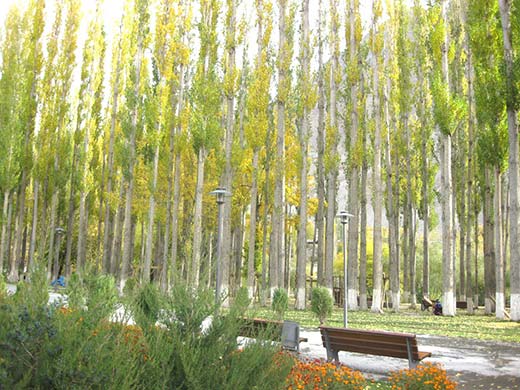Experts and residents alike are concerned about the Pheosia Albivertex pest, which may have originated in China or Pakistan and is attacking poplar trees in Ladakh, according to the Chandigarh Tribune.
Poplar plantings in the area, which are essential to the livelihood of nearby farmers, are seriously threatened by this infestation, which is made worse by shifting climatic circumstances.Ladakh lacks timber and is a desert. Poplars, apricot trees, and a few other trees provide the majority of its essential timber needs.
After visiting the impacted areas, teams from the Forest Department, Kargil, and Krishi Vigyan Kendra (KVK) urged prompt action to stop the spread. The newspaper was informed by Saliskot area councillor Sajjad Khan that the pest had harmed trees in his seat. Khan gave an assurance that farmers whose trees have been harmed would receive full support from the Ladakh Autonomous Hill Development Council (LAHDC), Kargil.
The publication reports that Dr. Mohammad Mehdi, Principal Scientist at KVK Kargil, has issued a warning regarding the possible financial losses in the event that the pest is not swiftly handled. He emphasized the need for community involvement in the outbreak’s management, pointing out that the bug completely defoliates trees.
Although the pest was first discovered a few years ago, it has not materially returned until recently. The authorities acted quickly to contain the most recent outbreak when a local citizen posted a video of the damaged trees on social media. In the area, poplar trees are a major source of income. If the pest is not controlled, it may spread to nearby places, making control efforts even more difficult, according to Mehdi.
According to a recent study by experts from Ladakh and Jammu and Kashmir that was published in the Journal of Asia-Pacific Biodiversity, the region, which is known for its high levels of sunshine, low humidity, and water stress, had not seen a substantial infestation of poplar pests until the last ten years. However, outbreaks of insect pests have increased due to global climate change and warmer, more humid summers in Ladakh.
According to the report, the pest was initially discovered in Dyanguchay hamlet in the Kargil district’s Suru Valley area and has since spread to neighboring places. It implies that the pest, which is still in the early phases of multiplication and dispersal in Ladakh, may have been accidentally introduced again. There have also been reports of the pest’s appearance in nearby areas, including China and the Pakistani side of Kashmir.
KVK Kargil has encouraged farmers to follow good hygiene practices in reaction to the outbreak by removing larvae from branches with brooms and discarding them. For the purpose of controlling this pest and preserving the poplar plantations that are essential to the local economy, scientists, government representatives, and farmers in the area must work together.
Kashmir has always prohibited the import of fresh fruit from Ladakh out of concern that bugs from the desert might harm its horticultural industry. Special consignments are being moved to the local market, though, as of late.









